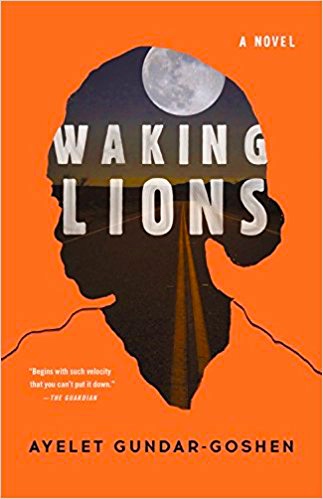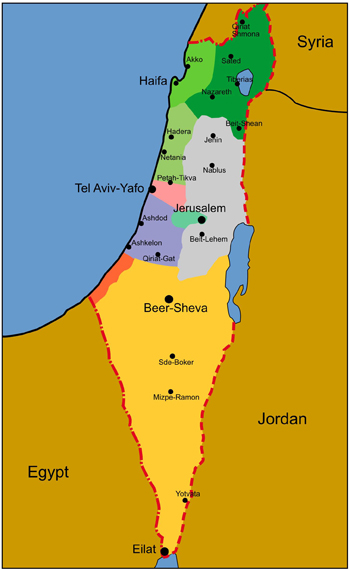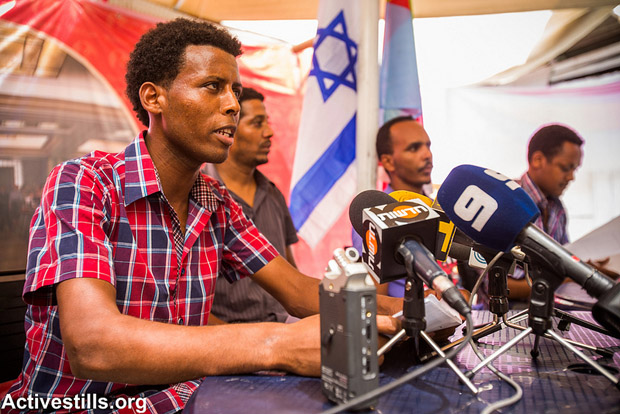Note: This novel was WINNER of the Jewish Quarterly Wingate Prize for 2017.
“A person dies but things remain. A chair. Cigarette butts. The memory of a foot. And maybe the song he used to whistle, which she couldn’t remember now. It was unbelievable that she couldn’t remember it. But maybe his whistling was like the plastic bags still roaming over the desert. A person dies, but his whistling still runs on the wind, crossing roads and ravines getting tangled in the sand and junk.”—thoughts of Sirkit, widow.
 An award-winning Israeli screenwriter and WINNER of Israel’s Sapir Prize for best debut fiction, Ayelet Gundar-Goshen may find a much larger audience with this new novel, her first one to be translated into English. Critics have been busy trying to describe her work, with many calling it literary fiction because of the excellence of the prose style and the complex development of her themes. Others, however, carried away by the action and its consequences, have described it as a thriller. And, since Gundar-Goshen is a clinical psychologist using this novel to explore the ways in which some people can sometimes suppress feelings of guilt, if given enough motivation to do so, the novel may also be described as an intense psychological novel. If one considers the author’s screenwriting experience, the novel sets itself up as a possible precursor to a dramatic film – its colorful characters and the variety of populations in the exotic Israeli desert ideal for a unique film, yet another possibility for this book.
An award-winning Israeli screenwriter and WINNER of Israel’s Sapir Prize for best debut fiction, Ayelet Gundar-Goshen may find a much larger audience with this new novel, her first one to be translated into English. Critics have been busy trying to describe her work, with many calling it literary fiction because of the excellence of the prose style and the complex development of her themes. Others, however, carried away by the action and its consequences, have described it as a thriller. And, since Gundar-Goshen is a clinical psychologist using this novel to explore the ways in which some people can sometimes suppress feelings of guilt, if given enough motivation to do so, the novel may also be described as an intense psychological novel. If one considers the author’s screenwriting experience, the novel sets itself up as a possible precursor to a dramatic film – its colorful characters and the variety of populations in the exotic Israeli desert ideal for a unique film, yet another possibility for this book.
The opening lines instantly establish the mood and tone. Eitan Green, a young doctor in Beersheba, Israel, having completed his night duty, is relaxing as he drives his SUV at high speed in the Negev desert, enjoying the sense of freedom and the beauty of the moon: “He’s thinking that the moon is the most beautiful he has ever seen when he hits the man. For the first moment after he hits him, he’s still thinking about the moon, and he suddenly stops, like a candle that has been blown out.” Stunned and fearful of what he will find when he sees the body of the man he has hit, the young doctor feels paralyzed: “If the man lying there is no longer a man he cannot imagine what will become of the man standing there, shaking, unable to complete one simple step. What will become of him?” The man Eitan Green has hit is Eritrean, a refugee thirty or forty years old, on the ground with his head crushed, and Eitan knows with certainty that the victim will die quickly. He briefly considers what will happen to him when he reports the death to the police, considers that he will probably get a few months in jail, and realizes that that sentence will end any chance of his doing surgery in the future. Another possibility is all too clear, however. “He couldn’t save this man. At least he’d try to save himself.” He convinces himself that the Eritrean actually has a smile on his face as he dies, “his closed eyes signaling his approval.”
Through flashbacks, the author establishes Eitan’s history, with his new job as a doctor in Beersheba, not Tel Aviv, where he began his career. He was effectively banished from Tel Aviv after he challenged and threatened to report his superior for taking payoffs. Eitan’s wife, a police officer, has supported the move to Beersheba, where they have more time to spend with their two young boys, and where they can restart their lives. Now, with the accident, however, Eitan is in a quandary. Though he slept well that night, he is now haunted by the image of the dead man, and though he knows that his SUV, “a Mercedes tank,” has not a scratch on it after the accident, he still ponders his actions, trying to convince himself that he was “right” to save himself since the Eritrean was dying anyway. A knock on his door sets the novel’s action in motion: “The woman at the door…was Eritrean, and she was holding his wallet in her hand.” She is Sirkit, wife of the man he killed, and she has a deal for him: He is free to do whatever he wants during the day, but his nights will belong to her.
No further description of the action is possible without ruining the novel’s many surprises, and Gundar-Goshen keeps the reader on tenterhooks throughout. Gradually, the reader comes to know – or think s/he knows – each of the main characters, their backgrounds, and their ways of life and usual behavior. Eitan’s wife Liat, horrified by the fact that the death of an Eritrean in the desert is not being investigated by her police department, decides to do some investigating herself, and soon uncovers some involvement by Bedouins, who are also smugglers. Sirkit, the widow of the man Eitan killed, proves to be a formidable figure, controlling many aspects of the lives of undocumented refugees, just as Liat, Etan’s wife, is similarly involved in dealing with Israeli teens and those in trouble. Violence between refugee husbands and wives living on the outskirts of society may be bloody, but the ultimate cost is not unlike what is happening with Eitan and Liat as their relationship begins to crumble with his constant absences. Two young refugees, whole-heartedly in love, remind Eitan of the early days in his courtship of Liat, though their fates are dramatically different – again, through no fault of their own. Gradually, Eitan becomes a more proficient liar, at one point even using blackmail to get something he wants and causing the reader to wonder how far Gundar-Goshen will be able to take Eitan without sacrificing the last vestiges of sympathy the reader may have for him.
Parts of the novel are too long – the backgrounds and family histories which lead the main characters to think the way they do are more detailed than necessary, and they sometimes interrupt the flow of the drama. The use of coincidence is obvious, also. The action moves quickly, however, earning the novel a place on the “thriller” list while also remaining on the “literary” list. It is carefully designed, with many comparisons and contrasts between the lives of the Israelis and those of the refugees, adding poignancy and depth to the characters and their stories. Gundar-Goshen has left some surprises for the conclusion, too, and readers will be more than satisfied by the clever way the novel reaches its conclusion. Though some may have a problem identifying with Eitan because of his basic dishonesty, others will chalk that all up to irony as the novel draws to a close. As Liat says, late in the novel, “ On safari in Kenya, after their wedding, the guide had told them that once a lion tastes human flesh, it won’t ever want to hunt anything else. Perhaps it wasn’t true, just a story for tourists, but her lioness’s instincts knew there was no greater temptation, no hunt more tantalizing than the ambush of your loved ones. That was why you should not do it.”
Photos, in order: The author’s photo appears on https://www.theguardian.com Photo by Katharina Lutscher, Bild.
The photo of Soroka Hospital in Beersheba is from https://www.israel21c.org/
The map of Israel showing Beersheba and the Negev may be found on https://www.pinterest.com The Negev is the entire yellow section below Beersheba.
Undocumented Eritrean asylum seekers, traveling through the Negev, must often choose between jail in Israel and death at home. https://972mag.com/




